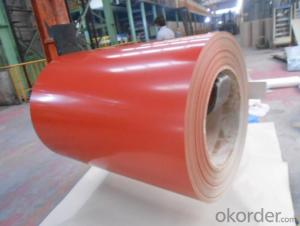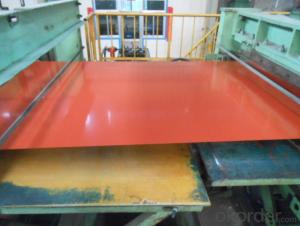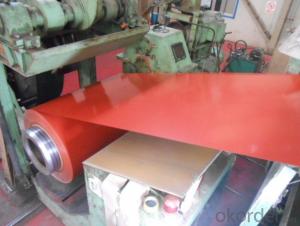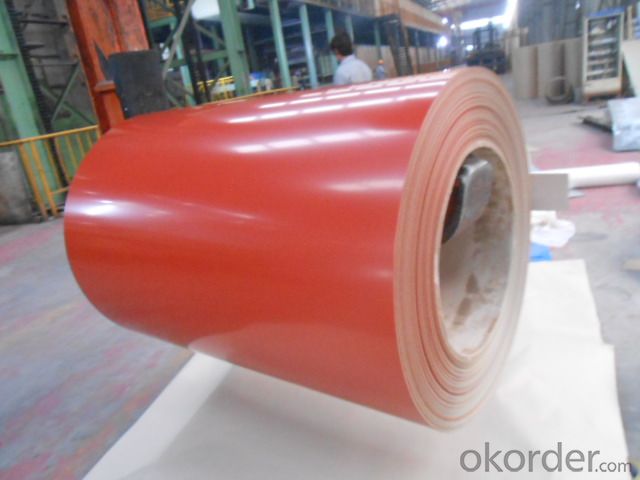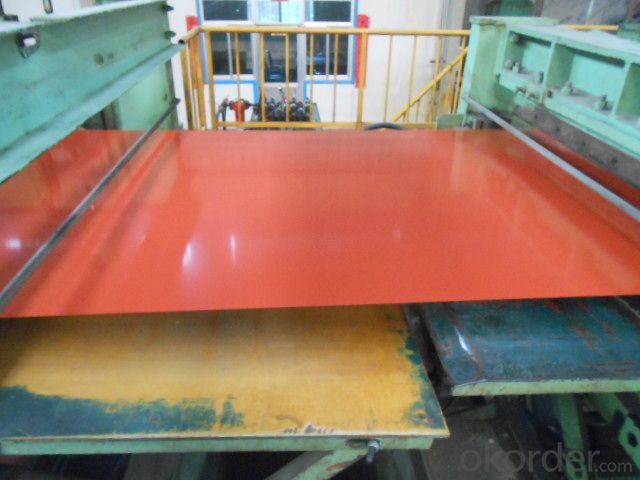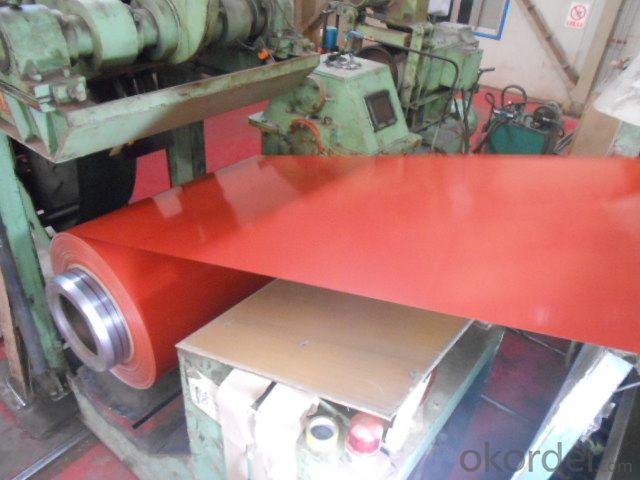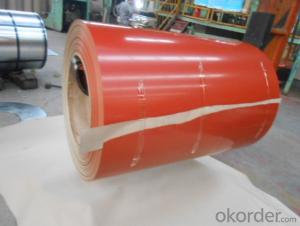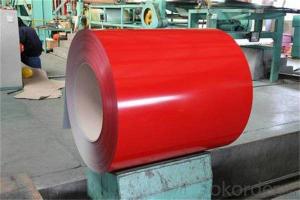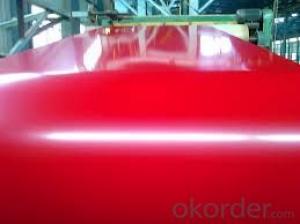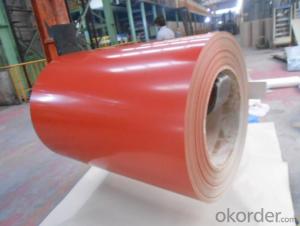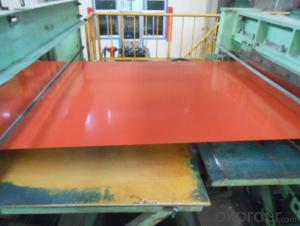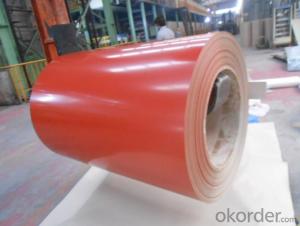PPGI,Pre-Painted Steel Coil with Prime Quality Red Color
- Loading Port:
- Shanghai
- Payment Terms:
- TT OR LC
- Min Order Qty:
- 200 m.t.
- Supply Capability:
- 10000 m.t./month
OKorder Service Pledge
OKorder Financial Service
You Might Also Like
1. Pre-Painted Galvanized/Aluzinc Steel Coil Description:
With GI as base material, after pretreatment (degrease and chemical treatment ) and liquid dope with several layers of color, then after firing and cooling, finally the plate steel is called pre-painted galvanized (aluzinc) steel. Pre-painted galvanized steel is good capable of decoration, molding, corrosion resistance. It generally displays superior workability, durability and weather resistance.
2.Main Features of the Pre-Painted Galvanized/Aluzinc Steel Coil:
• Excellent process capability
• Smooth and flat surface
• Workability, durability
• Excellent heat resistance performance
• High strength
• Good formability
• Good visual effect
3.Pre-Painted Galvanized/Aluzinc Steel Coil Images
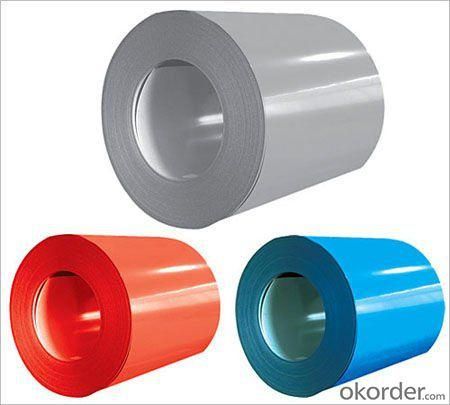
4.Pre-Painted Galvanized/Aluzinc Steel Coil Specification
Standard: AISI, ASTM, BS, DIN, GB, JIS
Grade: DX51D, DX52D
Thickness: 0.17-2.0mm
Brand Name: KMRLON
Model Number: coil
Type: Steel Coil
Technique: Cold Rolled
Surface Treatment: Coated
Application: Boiler Plate
Special Use: High-strength Steel Plate
Width: 20-1250mm
Length: customized
commoidty: pre-painted galvanized steel coil
Thickness: 0.13-4.0mm
width: 20-1250mm
zinc coating: 40-180g/m2
printing thickness: top side: 20+/-5 microns, back side: 5-7 microns
color: all RAL color
surface treatment: color coated
coil weight: 4-7 tons
coil ID: 508/610mm
packaging: standard seaworthy packing
5.FAQ of Pre-Painted Galvanized/Aluzinc Steel Coil
1. What’s the application of this product?
Roof, roof structure, surface sheet of balcony, frame of window, etc.
2. What’s the brand of the paint?
We use the best brand of all of the word—AKZO.
3. How to guarantee the quality of the products?
We have established the international advanced quality management system,every link from raw material to final product we have strict quality test;We resolutely put an end to unqualified products flowing into the market. At the same time, we will provide necessary follow-up service assurance.
4. How long can we receive the product after purchase?
Usually within thirty working days after receiving buyer’s advance payment or LC. We will arrange the factory manufacturing as soon as possible. The cargo readiness usually takes 15-25 days, but the shipment will depend on the vessel situation.
- Q: what exactly does it mean when some sword makers refer to finding the truth of steel. I have heard that many have tried to find the truth but i dont really understand what there is to find.
- I am unsure of what the Truth of Steel is, but here is the Riddle of Steel (from Conan) Thulsa Doom: Yes! You know what it is, don't you boy? Shall I tell you? It's the least I can do. Steel isn't strong, boy, flesh is stronger! Look around you. There, on the rocks; a beautiful girl. Come to me, my child... Thulsa Doom: [coaxes the girl to jump to her death] Thulsa Doom: That is strength, boy! That is power! What is steel compared to the hand that wields it? Look at the strength in your body, the desire in your heart, I gave you this! Such a waste. Contemplate this on the tree of woe. Crucify him!
- Q: i was thinking like getting a a steel building for 2 or 3 stall does anyone know how much that would cost? Have anyone used steel building how do you like them etc
- I have two steel barns, one is 4 stables. 15 x12 for 3 stables and the other 12 x 18 I have a large tackroom and an area for storing gardening and farm light machinery. (Chain saws. strimmers and fencing stuff.) The second barn has 4 stables 12 x 15. an 8' aisle and then two large loose shed areas. 30' x 50'. I can run these as one pen if I want. I have 45' x 70' at the other end for storing hay and straw. Haven't a clue to the cost but it wasn't cheap! Although it is all steel the lower walls of the stables are all blocks. I didn't want to line the steel with wood as they eat it for fun. The loose shed are lined with hard board.
- Q: What are the common methods of slitting steel coils?
- The common methods of slitting steel coils include rotary slitting, multiblade slitting, and shearing.
- Q: Can steel coils be bent or formed into different shapes?
- Yes, steel coils can be bent or formed into different shapes through various processes such as rolling, bending, or stamping.
- Q: What are the dimensions of steel coils used in the energy sector?
- The dimensions of steel coils used in the energy sector vary depending on the specific application and requirements. However, common dimensions range from 0.3 to 3 millimeters in thickness and 600 to 2000 millimeters in width. The inner diameter of the coil typically ranges from 508 to 610 millimeters, while the outer diameter can vary from 1000 to 2000 millimeters. It's important to note that these dimensions can be customized to suit different needs and specifications.
- Q: Which one would be stronger? And should damascus steel be tempered?Thank You
- carbon steel it is stronger it is the type ill be using when i stare forging
- Q: Help please.What atoms are there in steel?Like water is equals to 1 Oxygen atom + 2 Hydrogen atoms.Thnx 4 d help.
- Steel is mostly iron with a small amount (less than 1%) of carbon added. Stainless steel has other metals like chromium and nickel added.
- Q: I was wondering if steel cases can be loaded to the same pressure as brass cases. Are the cartridges that commonly feature steel cases like the Russian 5.45x39, 7.62x39 and 7.62x54R loaded to a lower pressure than their C.I.P. MAPs (380 MPa, 355 MPa, 390 MPa --gt; 51,488 psi to 56,564 psi)? There must be a reason why most NATO armies use brass cases...
- Steel cases are harder to manufacture, but cheaper in material. Loaded? Yes. Those cases are a very mild steel, and will 'flow' well enough to seal at the pressures involved. The question might come up with low pressure loads though. RE-loaded?? - I wouldn't try it, even if they weren't berdan primed.
- Q: On a fixie frame what should i get an aluminum frame or a steel frame
- I'm afraid you have opened a can o'worms. Aluminum as a material is roughly 1/2 the weight of steel. Aluminum as a material is also roughly 1/3 the strength of steel. his means you need 3 times more aluminum to make a frame as strong as steel which makes the aluminum frame 25% heavier. That being said, well designed and more expensive aluminum frames can easily weigh less than low zoot steel. Buying a cheap bike with an aluminum frame will ALWAYS weigh more than a middle of the road bike with a steel frame. ...and THAT being said, high end steel can easily weigh less than a high quality aluminum frame... note we are talking frames in the $2000 range- just for the frame. So, based on your explanation and attendant budget of the bikes you are considering, buy the steel bike. You won't be losing or gaining anything... except saving money.
- Q: How are steel coils distributed globally?
- Steel coils are distributed globally through various means such as shipping, rail, and truck transportation. They are typically transported in bulk quantities to steel processing plants, construction sites, and manufacturing facilities worldwide. Distribution channels and logistics networks play a crucial role in ensuring efficient and timely delivery of steel coils to meet the demands of different industries and markets across the globe.
Send your message to us
PPGI,Pre-Painted Steel Coil with Prime Quality Red Color
- Loading Port:
- Shanghai
- Payment Terms:
- TT OR LC
- Min Order Qty:
- 200 m.t.
- Supply Capability:
- 10000 m.t./month
OKorder Service Pledge
OKorder Financial Service
Similar products
Hot products
Hot Searches
Related keywords
